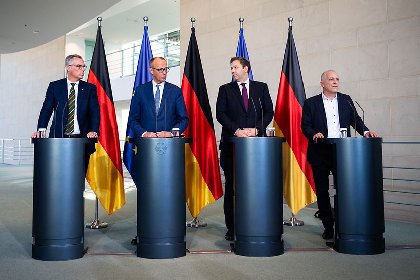German Chancellor Friedrich Merz hosted a high-level Steel Summit at the Federal Chancellery in Berlin on Thursday, November 6, bringing together ministers, state representatives, trade unions, and steel industry leaders to address what participants called an existential crisis in the country’s steel sector.
The discussions focused on global overcapacity, unfair trade practices, energy costs and the green transformation. Participants agreed that safeguarding the sector is essential to Germany’s industrial sovereignty, employment and climate neutrality goals.

Trade defense and industrial sovereignty
Chancellor Merz underscored that Germany’s goal is to secure domestic steelmaking through competitiveness, not protectionism. “Only competitive companies can secure productivity and jobs in the long term,” he said.
Both Merz and finance minister Lars Klingbeil called for a comprehensive steel strategy centered on fair trade, innovation and energy affordability.
The government reaffirmed support for a robust, World Trade Organization (WTO)-compliant successor to EU safeguard measures, which expire in June 2026, and backed the European Commission’s new steel import quota proposal.
Berlin will also advocate lifting US tariffs on EU steel and aluminum, end sanction exemptions for Russian semi-finished steel, and support higher tariffs and reduced quotas for non-compliant producers failing to meet carbon benchmarks.
Merz emphasized reinforcing the Carbon Border Adjustment Mechanism (CBAM) to prevent carbon leakage, extend coverage to downstream steel products, and simplify the system for exporters.
If reforms stall, Germany supports continuing free EU Emissions Trading System (ETS) allowance allocations to maintain competitiveness.
Energy relief and industrial power prices
A central focus was energy affordability. Merz and Klingbeil stressed that competitive electricity costs are crucial for Germany’s energy-intensive sectors, particularly steel.
The government has announced that existing relief measures such as abolition of the gas storage levy, reduction of electricity tax to the EU minimum, and lower network transmission fees, will save €6.5 billion in 2026.
In parallel, Berlin plans to introduce an industrial electricity price arrangement and an expanded compensation scheme by 2026, developed jointly with the European Commission. These tools aim to keep steelmaking viable during the climate transition.
Decarbonisation and innovation support
Germany reaffirmed its commitment to funding industrial transformation via the Federal Funding Program for Industry and Climate Protection, carbon difference agreements and the -Important Projects of Common European Interest (IPCEI) hydrogen program.
Recognizing delays in hydrogen roll-out, Berlin urged greater EU funding flexibility, including temporary use of natural gas in transitional projects. The government will accelerate development of the national hydrogen core network to connect steel plants directly to the hydrogen supply infrastructure.
Circular economy and scrap supply security
The Summit also emphasized the role of steel recycling and scrap management in strengthening resilience and lowering emissions. Germany will press for EU-level safeguards ensuring strategic access to steel scrap, considered vital for the circular economy and EAF-based decarbonisation.
European steel preference and market competitiveness
To sustain domestic demand, Merz and Klingbeil endorsed giving preference to European-made steel in public procurement, particularly for rail infrastructure and defense projects.
Germany plans to:
- implement sustainability-based procurement rules under the Public Procurement Acceleration Act,
- launch a Low Emission Steel Standard (LESS) certification label for green steel, and
- promote lead markets through the G7 Climate Club for internationally recognized green steel standards.
Industry reaction: “a turning point for steel”
Gunnar Groebler, president of the German Steel Federation (WV Stahl), called the summit “a turning point,” noting that cheap imports and unfair market practices threaten domestic production. He welcomed Berlin’s commitment to robust trade defense, CBAM implementation and affordable industrial power.
Jürgen Kerner, second chairman of metalworkers’ union IG Metall, emphasized that steel is the backbone of Germany’s industrial transformation, stating that, if they succeed in transforming the steel industry, they can succeed in transforming the entire industrial economy. If they fail here, they fail altogether, he said.